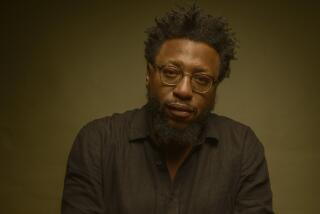Chronicling President Barack Obama
David Remnick wanted to tell a story about his weighty new biography, “The Bridge,” one of a slew of Barack Obama books landing this year.
The tale involved one of his competitors, Newsweek columnist Jonathan Alter, whose own narrative of Obama’s first year in office, “The Promise,” comes out this week.
But as he leaned across a table on the patio of the Four Seasons Hotel in Beverly Hills, Remnick wanted to make one thing clear. “I know Jon Alter,” said the editor of the New Yorker, who on this breezy afternoon wore an oatmeal-colored sweater, gray T-shirt and shorts. “I like him a lot.”
It seems the two men were at a 50th birthday for a friend, chatting about their books. “I’d been carrying around a title in my head,” recalled Remnick. “It was called ‘The Promise.’ So I said, ‘Jon, what’s your title?’ ”
To which an unsuspecting Alter replied, “The Promise.”
Remnick was stunned. “So rather than go, ‘You’re not going to believe this,’ I didn’t say anything.”
In the end, the unlikely dilemma worked itself out. Remnick happily settled on “The Bridge,” a title better suited to the racial themes in his biography.
Such is the complicated life of an Obama author. Not only do you have to carve out your own take on a historical figure other big-name journalists are writing about. You also have to fear that one has your title.
As for those other authors, they include Remnick’s colleague, Ryan Lizza; Washington Post reporter David Maraniss; and Bob Woodward. Given Woodward’s track record, that could be bad news for the other Obama books.
Naturally, among so many top political writers, there was a scramble to be first. Although Remnick trounced everyone by getting his book out the first week of April — all, mind you, while performing his day job at the New Yorker — Alter wasn’t exactly a slacker.
“I did feel pressure because I wanted to be first, and I think it’s important for the reader’s attention to be out of the gate first,” Alter explained in a phone interview. “But that I’m six months ahead of everybody else is a pleasant surprise. Maybe it was because of the fear of getting beat?”
Whereas “The Bridge” reads like a scholarly effort, with its deeply layered stories on civil rights history, “The Promise” has the feel of a political thriller. “I really tried to take people into the Oval Office and the places where decisions are made,” Alter said.
He interviewed some 200 government officials on frequent trips to Washington, and it’s clear Obama’s protective inner circle trusted the Chicago native, who first met the future president in 2002. Candid and down-to-earth, Alter confided that his publisher was so worried about leaks that it didn’t print many galleys.
Still, the details of the president’s life would seem to be common knowledge — in part because of two bestselling memoirs by Obama himself.
A 25-year veteran of Newsweek, Alter was keenly aware of the challenge. “If you’re writing about such a familiar figure, it’s essential that you tell people things they don’t know,” he said. “I think people are really interested in him as human being. He’s the most observed but least understood figure in the world. So I wanted to know, what’s he like in the presidency?
“What is more compelling than that?”
Remnick took a decidedly different focus. “I’m trying to give a biography of a very specific politician,” he said, “a very close look at race in his life, and in the context of being the first African American president.”
Asked what he learned about Obama, he said: “The surprises all came on the level of details about race, details about discrimination.”
In Chicago, for instance, Remnick interviewed an array of political types who helped Obama forge his career — and some who tried to thwart it.
“I was stunned by the degree of cagey political in-fighting, the intra-generational fighting that’s going on at the beginning of his career,” he said. “Chicago is a very complicated environment. You don’t just come in and plant your flag.”
Like Remnick, Alter got his fresh material from old-fashioned reporting. He may not have attended the climate change conference in Copenhagen, an event covered by more than 1,000 journalists. “But I was the only person who found out what happened in the room with the Chinese,” he said.
Besides his fascination with Obama’s presidency, Alter had a more personal reason for writing. His mother, Joanne, knew Obama and supported him. She died a few days after his election.
“One of the very very last things she did,” said Alter, “when she was in a semi-comatose state was go down and vote.” At her funeral, he joked that she cast her ballot “Chicago-style, which was my father and I helped her vote.”
Shortly after her death, the president left a voice mail message for the journalist.
That doesn’t mean the White House is delirious about Alter’s book, with its in-depth accounts of turf wars, political wrangling and backstabbing, as the president grappled with crucial policy decisions such as healthcare and the economic stimulus.
When Alter sent galleys to certain people in the Oval Office, “I guess I could describe the reaction as mixed,” he said with a laugh. Some people liked it, some didn’t. “And that’s exactly where I want to leave it.”
Remnick chose not to open that particular door. “That’s asking for trouble,” he said.
Besides, he added, “I’d rather the president were doing other things than reading a 600-page biography of himself.”
For the record, the two authors have read each other’s books. Recently, they exchanged complimentary e-mails.
What did Remnick say? Alter’s not talking. “It was a private e-mail, but it was extremely nice and supportive.”
He does, however, have advice for readers trying to decide between them. “You have to read both,” he laughed.
More to Read
The biggest entertainment stories
Get our big stories about Hollywood, film, television, music, arts, culture and more right in your inbox as soon as they publish.
You may occasionally receive promotional content from the Los Angeles Times.






